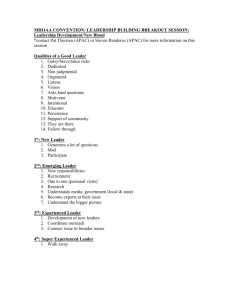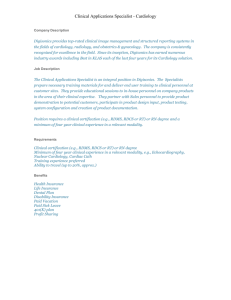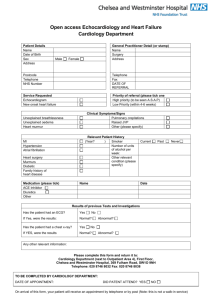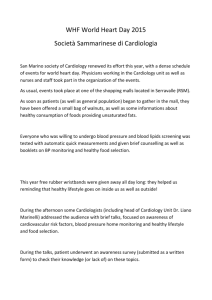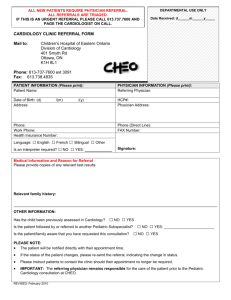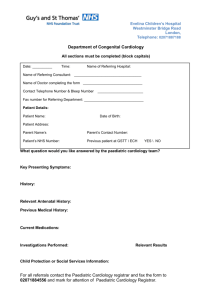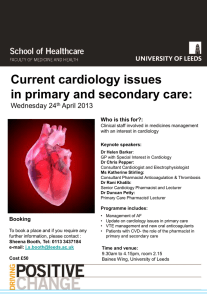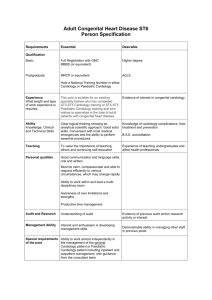Fall 2014
advertisement
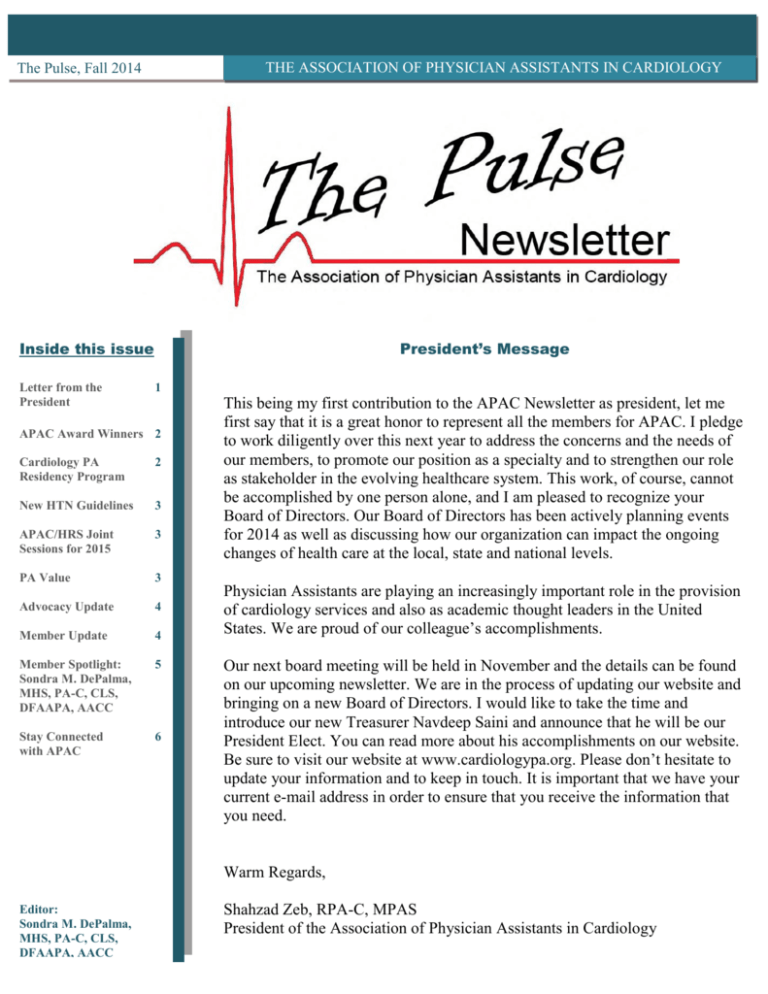
Insert Headline HereASSISTANTS IN CARDIOLOGY THE ASSOCIATION OF PHYSICIAN The Pulse, Fall 2014 Month Day Year Vol. 1 Issue 1 Inside this issue Letter from the President President’s Message 1 APAC Award Winners 2 Cardiology PA Residency Program 2 New HTN Guidelines 3 APAC/HRS Joint Sessions for 2015 3 PA Value 3 Advocacy Update 4 Member Update 4 Member Spotlight: Sondra M. DePalma, MHS, PA-C, CLS, DFAAPA, AACC 5 Stay Connected with APAC 6 This being my first contribution to the APAC Newsletter as president, let me first say that it is a great honor to represent all the members for APAC. I pledge to work diligently over this next year to address the concerns and the needs of our members, to promote our position as a specialty and to strengthen our role as stakeholder in the evolving healthcare system. This work, of course, cannot be accomplished by one person alone, and I am pleased to recognize your Board of Directors. Our Board of Directors has been actively planning events for 2014 as well as discussing how our organization can impact the ongoing changes of health care at the local, state and national levels. Physician Assistants are playing an increasingly important role in the provision of cardiology services and also as academic thought leaders in the United States. We are proud of our colleague’s accomplishments. Our next board meeting will be held in November and the details can be found on our upcoming newsletter. We are in the process of updating our website and bringing on a new Board of Directors. I would like to take the time and introduce our new Treasurer Navdeep Saini and announce that he will be our President Elect. You can read more about his accomplishments on our website. Be sure to visit our website at www.cardiologypa.org. Please don’t hesitate to update your information and to keep in touch. It is important that we have your current e-mail address in order to ensure that you receive the information that you need. Warm Regards, Editor: Sondra M. DePalma, MHS, PA-C, CLS, DFAAPA, AACC Shahzad Zeb, RPA-C, MPAS President of the Association of Physician Assistants in Cardiology The Pulse, Fall 2014 Month Day Year Insert Headline Here Vol. 1 Issue 1 2014 APAC Member Awards APAC announced its first annual Member Awards. Congratulations to the 2014 winners: Visit APAC at Morton A. Diamond13 Lifetime Achievement Award IMPACT Michael Clark, PA-C, MPAS, PhD, AACC APAC PA of the Year Award Sondra M. DePalma, MHS, PA-C, CLS, DFAAPA, AACC Cardiology PA-Physician Team Award Joseph Faiella-Tommasino, RPA-C, MHS, PhD and Michael Poon, MD APAC looks forward to recognizing more distinguished members in 2015. Award descriptions and criteria are available at http://www.cardiologypa.org/member/member-awards Mercer-Piedmont Heart Physician Assistant Post-Graduate Residency in Advanced Cardiology The Mercer-Piedmont Heart Physician Assistant Post-Graduate Residency in Advanced Cardiology is currently seeking qualified applicants for its 12-month program. A collaborative effort between the Mercer University Physician Assistant Program and the Piedmont Heart Institute, it is one of the first advanced cardiology post-graduate PA residencies of its kind. “Educational advancements in the field of cardiac medicine are being made every day,” said Jason Lucas, Ph.D., PA-C, co-director of the program. “Programs like this allow physician assistants to specialize and be better equipped to serve patients with advanced cases of heart disease. Empowering and supporting physician assistants in their clinical efforts not only prepares them for their careers but also enhances the clinical care heart patients receive.” Residents in the program devote 75% of their time to clinical medicine, working alongside industry experts, directly participating in all aspects of patient care in both the inpatient and critical care setting. Each resident works a 12-month schedule that includes everything from rotations in general and interventional cardiology, cardiothoracic surgery and advanced heart failure with exposure to LVAD, ECMO and open heart surgery. Another 25% of the program is dedicated to a didactic curriculum where residents have an opportunity to participate in interactive learning that occurs between residents and program faculty with case-based presentations, small group lectures and journal clubs. Residents also take part in grand rounds, lectures and additional instruction at the Mercer PA Program. Three residents from South College in Knoxville, Tenn., Mercer University in Atlanta, Ga., and Stanford University/Foothill College in Palo Alto, Calif. are currently participating in the residency program with the first expected to graduate at the end of the year. The program will soon be accepting new applications for the July 2015 – June 2016 residency year. For additional information, including application requirements, visit piedmontheart.org/mercerPA. Page 2 The Pulse, Fall 2014 Page 3 ACC/AHA Guideline for the Management of Patients with Hypertension Coming soon . . . The American College of Cardiology and the American Heart Association will work with partnering organizations to create new hypertension guidelines to complete the cardiovascular prevention guideline armamentarium. The American Society of Hypertension has announced that they are working as an “equal partner” on the new guidelines. The American Academy of Physician Assistants was also asked to partner and Sondra DePalma, Immediate Past President of APAC, will serve as the AAPA representative on the guideline writing committee. Chaired by Paul Whelton, MD, the guideline writing committee will begin working on the new guidelines in November, with potential release in 2015. The 2014 Evidence-Based Guideline for the Management of High Blood Pressure in Adults published in the Journal of the American Medical Association by the Panel Members appointed to the eighth Joint National Committee (JNC 8) was not endorsed by any medical organization. The American Heart Association has been critical of the document with AHA Past President Mariell Jessup, M.D stating, “We believe there’s just not enough evidence at this point to justify such a major change in how we treat people with high blood pressure” Joint Session at Heart Rhythm 2015 Ideas.People.Technology For the second year in a row, APAC will be partnering with the Heart Rhythm Society (HRS) in a Joint Session at the HRS 2015 conference. Presentation submissions from partnering organizations were competitively reviewed by the Heart Rhythm Society’s Scientific Sessions Program Committee on the basis of overall medical and scientific interest to the attendees at the meeting. The session proposal submitted by the Association of Physician Assistants in Cardiology entitled, “Device-Detected Atrial Arrhythmias and Stroke Risk”, has been selected for presentation on Thursday, May 14, 2015, 8:00-9:30 a.m. Join APAC at HRS in Boston May 13-16, 2015 A new nationwide study confirms that patients believe PAs add value to healthcare teams and provide excellent patient service The study, conducted by Harris Poll on behalf of AAPA, surveyed more than 1,500 U.S. adults. Among an oversample of 680 Americans who have interacted with a PA in the last year (meaning either they personally saw a PA or were present for the visit of someone they care for), the survey revealed strong support for the care PAs deliver: 93 percent agree PAs are going to be part of the solution to address the shortage of healthcare providers. 93 percent agree PAs are trusted healthcare providers. 92 percent agree having a PA at a practice makes it easier for a patient to get an appointment. 91 percent agree PAs improve health outcomes for patients. 91 percent agree PAs improve the quality of healthcare. Reprinted from the AAPA Medical Watch The Pulse, Fall 2014 Page 4 Advocacy Update American College of Cardiology APAC members continue to be actively involved with the ACC and serve on many workgroups and committees to represent cardiology PAs. Heart Rhythm Society The International Board of Heart Rhythm Examiners (IBHRE) continues to offer advanced certification for PAs and other non-physicians as Certified Electrophysiologist Specialists and Certified Cardiac Device Specialists. American Society of Hypertension ASH and the ASH Hypertension Specialists Program approved a platform for Physician Assistants, Nurse Practitioners and Clinical Pharmacists to be designated as specialists in hypertension. Responding to the team approach to medicine and the public health importance of hypertension, ASH is creating a method for PAs to demonstrate a mastery of hypertension and a certification process for designation as a Specialist in Hypertension. National Lipid Association The NLA encourages PA membership and the Accreditation Council for Clinical Lipidology (ACCL) certifies PAs and other non-physicians as Clinical Lipid Specialists. Member Update Sharon M. Dickinson, PA-C, AACC serves as the CCA Liaison for the Oregon Chapter of the ACC. Kelly Wood, PA-C, AACC presented at the South Carolina & North Carolina Chapters of the ACC 21st Annual Joint Meeting September 26-28, 2014 in Kiawah Island, South Carolina. Amy Simone, PA-C served on the planning committee and was an invited speaker at the Maryland Chapter of the ACC’s Foundations for Practice Excellence: Core Curriculum for the Cardiovascular Clinician. Sondra M. DePalma, MHS, PA-C, CLS, DFAAPA, AACC was also an invited speaker on behalf of the AAPA and discussed “The Future of the Cardiovascular Clinician”. Camille Dyer, MS, PA-C, AACC, DFAAPA and Sondra M. DePalma, MHS, PA-C, CLS, DFAAPA served as 2015 AAPA Conference CME Sessions Graders for the upcoming IMPACT.15 to assure that relevant and educational cardiology content is included at the national AAPA conference which is in San Francisco, CA May 2015. The Pulse, Fall 2014 Month Day Year Insert Headline Here Vol. 1 Issue 1 Page 5 Member Spotlight: Sondra M. DePalma, MHS, PA-C, CLS, DFAAPA, AACC Physician Assistant Clinical Lipid Specialist Penn State Hershey Heart & Vascular Institute Penn State Milton S. Hershey Medical Center How/Where did your career in cardiology begin? I went into cardiology directly after graduation from PA school. This was part planned but mostly serendipitous. I really enjoyed my internal medicine rotation and was very interested in cardiometabolic risk (diabetes, HTN, etc). I applied for my first cardiology position because it was in the location I wanted to live and was an internal medicine subspecialty. I can't say that I ever really considered cardiology in PA school, but I immediately fell in love the specialty and cannot imagine doing anything else. How long have you been practicing? In which cardiovascular area do you specialize? I have been a Cardiology PA for over 12 years. I have advanced certification as a Clinical Lipid Specialist through the Accreditation Council for Clinical Lipidology. At the Penn State Hershey Heart and Vascular Institute I practice general cardiology but work closely with our electrophysiologists and heart failure specialists, and am involved in the Lipid and Cardiovascular Wellness Program. How long have you have been a member of APAC, and what has been your involvement? I joined APAC in 2005 and began serving on the Board as a Director at Large from 2011-2012. I was the President from 2012-2014 and currently serve as the Immediate-Past President. I look forward to being involved for years to come. Are you active with any other cardiovascular associations? If so, what committees do you serve on and/or what leadership positions do you hold? I am an active member of the American College of Cardiology. I serve on the ACC’s LDL: Address the Risk Oversight Work Group, CVT Membership Work Group, and the Physician Assistant Work Group and PA Strategic Planning Sub-Work Group; and served on the 2013 Scientific Sessions Planning Committee. I am also actively involved in the AAPA and serve on the National Cardiovascular Risk Reduction Educational Advisory Board and have been the Chief Cardiology Delegate in the AAPA House of Delegates. What is your personal philosophy on how PAs and the cardiovascular team influence the practice of cardiology? In cardiology as in other specialties, PAs are well-trained in the medical model to provide evidence-based, high-quality comprehensive care in collaboration with other healthcare providers. Heart and vascular diseases are the leading cause of morbidity and mortality in the United States, and physicians need help in primary prevention and secondary treatment. While my physician colleagues are performing invasive procedures and interpreting advanced cardiac imaging, I am spending time with the patient in making clinical assessments, prescribing patient-centered therapies, educating, and coordinating care to improve patient satisfaction and outcomes. If you are a cardiologist, who better to partner with than the profession who pioneered team-based practice and has been doing it successfully for over 50 years?! Do you have any recommendations on how other PAs can become further involved in APAC? Just do it! Members of APAC are very welcoming and love new people and fresh ideas. How can APAC members get in touch with you? Email me at: sondramd@hotmail.com Be featured in an upcoming Member Spotlight “INSERT PULL QUOTE HERE. Learn more at http://www.cardiologypa.org/news-a-events/newsletter DELETE BOX IF NOT IN USE.” The Pulse, Fall 2014 Month Day Year Vol. 1 Issue 1 Get published in upcoming editions of The Pulse! Have a topic that you’d like to write about? Want to see your thoughts and ideas in print? Have personal experiences or clinical pearls that may help fellow Cardiology PAs? We want to hear from you! Your article and picture could be featured here. We are currently looking for members and students to submit articles on a variety of topics to APAC for consideration to be included in an upcoming edition of The Pulse newsletter. Members may write about any topic of their choice, and should limit their submissions to 500 words or less. Suggested topics are clinical tips and tricks, brief case studies, and current events and issues facing the PA profession. Students are welcome to write about topics such as student life, why they chose the PA profession, what they’ve experienced during their cardiology rotation and other topics relevant to students. Although this is not intended for scholarly use, ideas that are put forth as factual should be supported with evidence and proper credit should be given to sources as appropriate to avoid intellectual infringement and plagiarism. There is no monetary compensation for articles selected for publication in The Pulse newsletter Articles may be edited for length and/or content. Articles should be submitted to apac.pulse@gmail.com for review. THE ASSOCIATION OF PHYSICIAN ASSISTANTS IN CARDIOLOGY www.cardiologypa.org apac.contact@gmail.com APAC P.O. Box 14 Holbrook, NY 11741 Page 6 The Association of Physician Assistants in Cardiology (APAC) is a professional organization for Physician Assistants who practice in Cardiology. Since recognition as a specialty organization in 2003, APAC has made considerable progress toward our goal of becoming the primary resource and advocate for all cardiology PAs. As a Constituent Organization of the AAPA, APAC collaborates with the Academy and actively participates in the House of Delegates at the AAPA annual meeting to assure representation of Cardiology PAs. APAC also works closely with the American College of Cardiology (ACC) and other national organizations to promote and advocate for increased utilization of PAs to provide high quality, cost-effective care to patients with cardiovascular disease. We’re online! Find, like, join, and follow us on these sites: http://www.linkedin.com/groups/As sociation-Physician-Assistants-inCardiology-023586?gid= 4023586&trk=hb_side_g https://www.facebook.com/pages/ Association-of-PhysicianAssistants-in-Cardiology/ 140965989317?ref=ts
